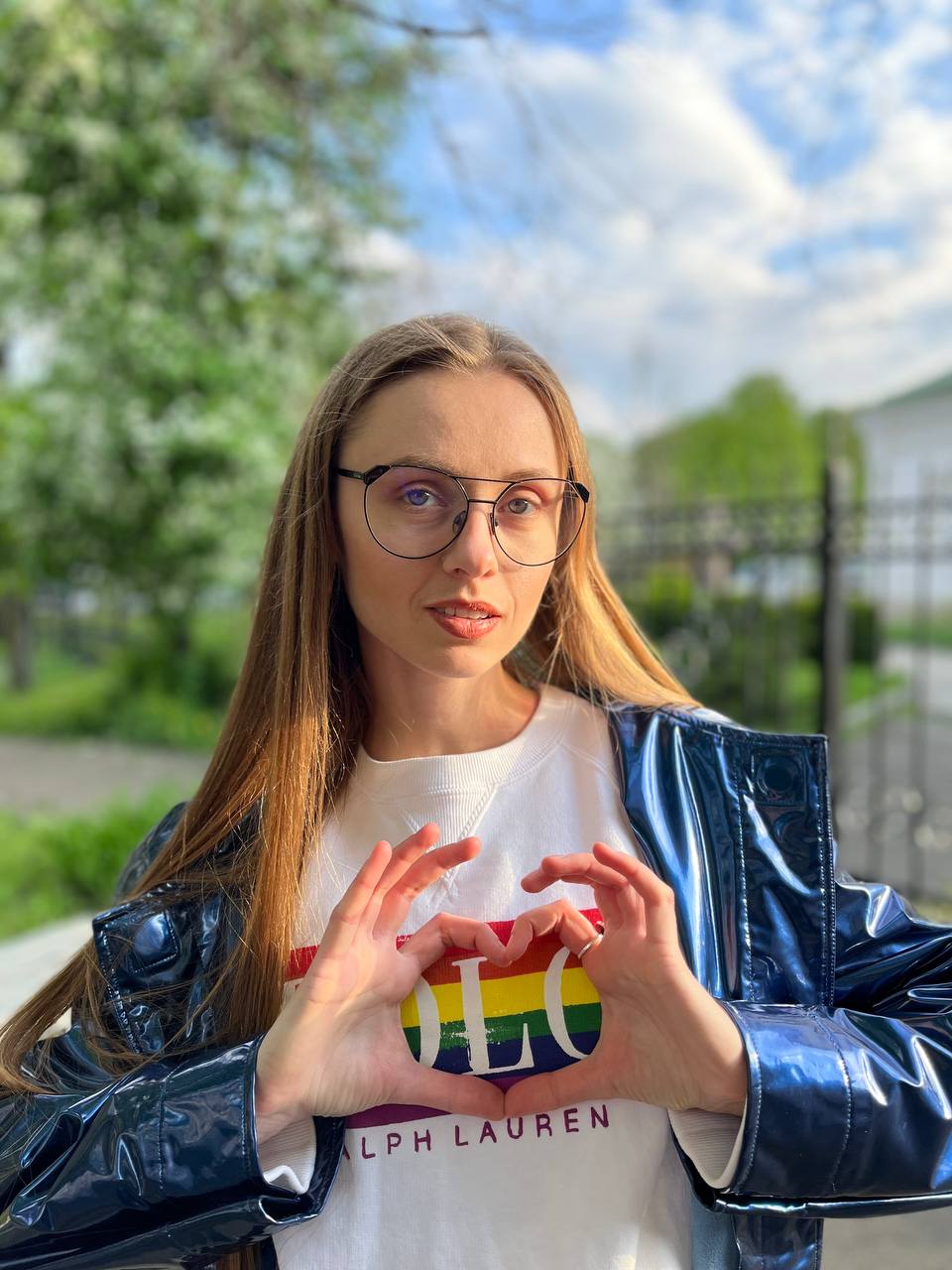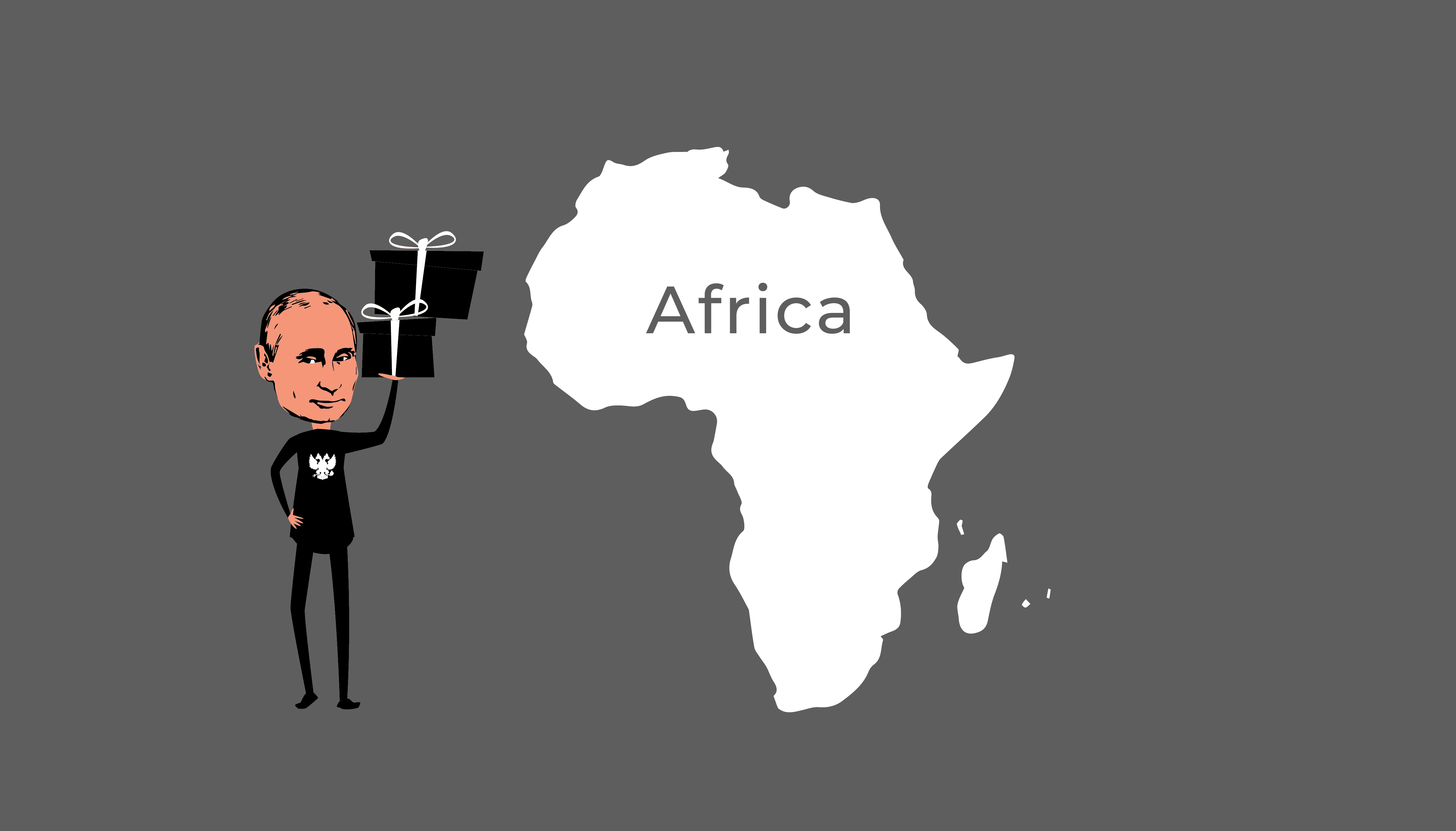

Українською читайте тут.
St. Petersburg hosted the second Russia-Africa summit on July 27-28. With over 23 years of rule under his belt, Putin gathered fellow long-standing leaders: Denis Sassou Nguesso of Congo with 26 years, Isaias Afwerki of Eritrea with 30 years, Yoweri Museveni of Uganda with 37 years, and Paul Biya of Cameroon boasting 41 years. The shift in the number of attendees from 43 African leaders in 2019 to just 17 this year underscores Moscow’s dwindling global stature, particularly after its full-scale invasion of Ukraine. However, undeterred by this diminishing international support, Moscow framed the event as a diplomatic triumph. For Putin, it served as a rare platform to connect with global leaders and broadcast his intention to diminish Ukraine’s influence in Africa. Here’s a look at the messages propagandists used to discredit Ukraine in the context of the Second Russia-Africa Summit.
From the days of the Soviet Union, Russia has maintained a certain clout in Africa. This influence is now manipulated to craft narratives that both validate its aggression against Ukraine and promote the idea of Russia’s special mission on the African continent. Maksym Subkh, Ukraine’s Special Representative for the Middle East and Africa, notes, “Russia consistently appropriates the narratives and signals of Soviet foreign policy, taking pride in accomplishments once shared with African nations. Yet, they conveniently omit the pivotal role Ukraine, as part of the USSR, played in assisting the development of post-colonial nations.” We have written in detail how Russian disinformation campaigns penetrate the media landscapes of countries of the Global South, such as Ghana, Egypt, Kenya, Nigeria, and South Africa. Ukraine is now working on renewing these relationships, realizing that past diplomatic engagements aren’t sufficient. In light of Russia’s full-scale invasion, Ukraine understands the need for not just economic but staunch political allies in Africa. Over the thirty years of its independence, Ukraine has developed stronger ties with Africa’s northern nations, predominantly members of the Arab League. However, relationships with other African countries have been more gradual in their evolution. Responding to this, Ukraine’s Ministry of Foreign Affairs dedicated 2023 to intensifying relationships with African nations, which led to the inauguration of ten new Ukrainian embassies and two diplomatic tours to the continent by Foreign Minister Dmytro Kuleba. Yet, as Ukraine strengthens its diplomatic connections, Russia endeavors to undermine them. They aim to unsettle Ukraine’s traditionally strong position in the grain supply chain to Africa. Before the war, Ukraine and Russia collectively dominated wheat imports to 15 African countries. Russia isn’t only employing forceful tactics like blockades and targeting Ukrainian grain shipments, but they’re also waging a softer, more insidious war to squeeze Ukraine out of African food markets, discrediting the Black Sea Grain Initiative and devaluing Ukraine as a partner. Russia regularly employs disinformation. Perhaps the most common message it uses is that Ukrainian grain does not reach the countries that really need it but ends up as animal feed in affluent Europe. The Kremlin used the Russia-Africa summit as another opportunity to discredit Ukraine as an international player and reliable economic partner, as well as to undermine Kyiv’s ties with Africa and raise the Kremlin’s stakes.
Discrediting is the attribution of negative traits and characteristics to create a negative image, as well as to undermine trust in someone or someone’s reputation. To discredit someone, propagandists fabricate images and videos and use rumors, devaluation, unfounded accusations, half-truths, and other forms of false information.
Here are the key theses that pro-Russian Telegram channels targeting Ukraine promoted about the Russia-Africa summit.
1. Ukraine’s Diplomatic Setback in the Global South Stemmed from Russia’s Anti-colonial Narrative
Russia primarily courts the backing of African nations by employing anti-colonial rhetoric. Such narratives resonate deeply with the Global South, given their historical experiences with colonialism. The term “neocolonialism” implies that, even after the official end of colonial regimes, the Western powers persist in their economic domination over their former territories, perpetuating global inequalities. As part of its Foreign Policy Concept sanctioned by Putin on March 31, 2023, Russia pledges to support African nations in their pursuit of a more equitable multipolar world. This policy asserts: “Russia stands in solidarity with African states in their quest to establish a fairer multipolar world and eliminate socio-economic inequality, which is exacerbated by the neocolonial policies of a number of developed countries towards Africa.” Yet, there’s an irony in Russia’s approach. Many in Africa view the conflict between Russia and Ukraine as a manifestation of colonialism, inherently eliciting their empathy towards Ukraine. But during the summit, Moscow consistently projected itself as a defender of nations oppressed by colonialism. To sustain this image, the propaganda machine has to emphasize its old notion that Ukraine is not truly independent and merely acts at the behest of Africa’s former colonizers.
Pro-Russian anonymous channels on Telegram in Ukraine have further propagated this narrative. They claim that “One of the reasons for the failure of Ukrainian diplomacy in the Global South is that Russia was able to form an opinion about confrontation with the West in the conflict in Ukraine.” However, it’s crucial to note that a majority of nations that Russia labels as the “Global South” firmly back Ukraine’s internationally acknowledged borders. This stance is validated by the UN General Assembly votes, resolutions backing Ukraine, and international opinion polls. Yet, these facts don’t negate the reality that leaders from various Asian, African, and American nations tread cautiously, juggling their support for Ukraine’s territorial rights with the immediate economic incentives of cooperation with Russia.
2. Russia Provides Grain to Africa, Compensating for Its Withdrawal From the Grain Deal
Amid concerns from African leaders over the collapsed grain agreement, Putin adopted a charitable stance by offering free grain. He stated, “To be specific, I will add that we will be ready in the coming months, in the next three to four months, to provide Burkina Faso, Zimbabwe, Mali, Somalia, the Central African Republic, and Eritrea with 25-50 thousand tons of grain free of charge. We will also provide free delivery of these products to the consumer.” However, this gesture pales in comparison to Ukraine’s sea-exported 33 million tons of grain during the year the agreement was in effect, as reflected in UN figures. Additionally, Russian missile attacks obliterated nearly 180,000 tons of Ukrainian grain within a fortnight following Russia’s exit from the grain deal, as reported by the Ukrainian Foreign Ministry. Notably, two countries on Putin’s charity list, Burkina Faso and Mali, recently faced African Union expulsion due to military coups. Eritrea, another beneficiary, has seen a 30-year unchanging presidency and is among the handful backing Russia in the UN. In the Central African Republic and Mali, pro-Russian Wagner Group mercenaries are active. Hence, Putin’s “charity” seems largely angled towards autocratic regimes that align with him.
Pro-Russian channels in Ukraine amplified the narrative of Moscow’s benevolence: “Putin masterfully undermines the West’s argument. How can they claim that quitting the ‘grain deal’ will lead to African famine now?” In reality, prior to the summit, the African Union, which unites the continent’s nations, demanded the reinstatement of the maritime export agreement for Ukrainian grain – an agreement Russia unilaterally exited on July 17. A significant opponent of the grain deal was President Cyril Ramaphosa of South Africa, the leader of Africa’s leading economy and a BRICS member alongside Russia. He pointedly remarked that Moscow’s “gifts” wouldn’t address Africa’s food security concerns: “We did not come here to ask for any ‘gifts’ for the African continent. Of course, we understand that you have generously decided to provide free grain to some African countries that are facing certain difficulties. We have great respect for that. However, it is not our main goal here, it is not our main task to secure such provisions.” UN Secretary-General Antonio Guterres echoed these sentiments, highlighting that minor aid to Putin-allied nations doesn’t remedy the larger grain deal issue. “It is clear that when taking out of the market millions and millions of tonnes of grains, it is clear that ... will lead to higher prices,” Guterres told reporters. “So it’s not with a handful of donations to some countries that we correct this dramatic impact that affects everybody, everywhere.”
Annually, the African continent imports over 70 million tons of wheat. This dwarfs Putin’s 20-50 thousand ton pledge. The African nations will now be forced to buy the grain they require at escalated prices due to the grain agreement’s fallout. Experts project that this could increase global grain prices by up to 15%. Thus, African leaders recognize that commercially available Ukrainian grain, previously accessible through the grain deal and now hindered by Russia, was a more reliable factor in food security than the selective and petty aid offered by Russia to loyal states.
3. Ukraine and Niger: Alleged Similarities in Political Turmoil
During the Russia-Africa summit, a dramatic turn of events unfolded in Niger. On July 26, Mohamed Bazoum, the head of state, found himself confined within the presidential palace in Niamey by his own personal guard. The following day, Niger’s General Staff declared their allegiance to the rebel presidential guard. Bazoum’s election in 2021 marked the first relatively democratic power transition for Niger, a nation that has undergone four military coups since its 1960 independence from France. Under Bazoum’s leadership, Niger was a key Western ally, particularly for France, which maintains a modest military presence in the country. The coup brings with it the looming danger of Niger leaning more towards Russia, mirroring developments in neighboring countries Mali and Burkina Faso. Both have fallen under the control of military juntas after recent coups. Russian Telegram channels broadcasted an audio clip from the leader of the Wagner PMC, Yevgeny Prigozhin, applauding the coup as a “fight against colonizers.” Concurrently, prominent bodies such as the African Union, the Economic Community of West African States (ECOWAS), the UN, and the EU, voiced their strong objections to the coup. ECOWAS, representing 15 West African nations, even declared its readiness to use military force if Niger’s rightful president isn’t reinstated. Niger has become the fourth country in three years to have its membership suspended from the ECOWAS due to a military coup. While Moscow officially denounced Niger’s coup, ties between Russia, its Wagner PMC mercenaries, and the installation of regional military juntas have strained Russian-African relations. Russia’s strategy seems to be garnering the backing of Africa’s sidelined factions at the expense of further alienating the majority.
Pro-Russian Telegram channels exploited Niger’s coup to draw parallels with Ukraine, broadcasting messages laden with propaganda and accusations: “The slaves (the people of Niger) decided to overthrow the TNCs (transnational corporations) and change the vector. Do you think corporations will just let this happen? Now they will strain the neighboring states, where their puppets are in power, so that they send armies and take back the “master’s assets”... Do you know how the situation in Niger is very similar to the Ukrainian crisis? In both Niger and Ukraine, the security of a global player was at stake... Ukraine threatened Russia’s physical security... Niger threatens France’s energy security... War is near.” Such posts not only brand Niger and its neighbors as mere corporate pawns but also seek to rationalize Russia’s actions against Ukraine, likening it to potential military interference by France or its African partners to reinstate Niger’s lawful leadership. Such conflicting narratives are characteristic of Russian propaganda, which can spin any global incident to seem favorable to Russia.
The Russia-Africa summit revealed vulnerabilities in Moscow’s information and geopolitical strategies. While Moscow’s “grain diplomacy” mainly appeals to its domestic viewers, it signals a seeming disregard for the Global South. Interestingly, this contrasts with the depiction by Russian diplomats and propagandists who suggest that Russia stands as a defender of the Global South. Russia’s anti-colonial stance is fast losing its allure, especially in light of its meddling in African affairs. This diminishing appeal is compounded by the questionable activities of Wagner PMC mercenaries who back African autocrats and illegitimate military leaders. Internationally perceived as a rogue state, Russia increasingly aligns with undemocratic regimes and war criminals, pushing mainstream African nations away and compelling Moscow to deepen ties with outcasted governments. Consequently, Russia finds itself caught in a self-destructive loop, eroding its diplomatic standing in the region. While Russia’s informational and military capabilities in Africa remain formidable, it has few ethical and rational arguments left—a reality becoming ever more evident.


